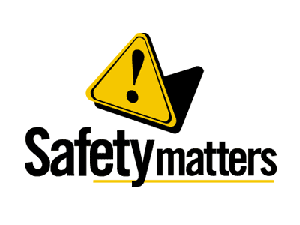
1. The instruction manual furnished with your machinery, especially the section on OPERATION.
2. Instructions for inspection and maintenance located at the rear of your manual.
3. Warning and caution plates located on the machine.
4. Warning and caution notes in the instruction manual.
5. Lubrication and Maintenance guides for periodic servicing.
Use Warning Tags: Before working on any equipment, attach warning tags directly to the machine, near the controls.
Use warning tags:
1. If the machine is unsafe for operation.
2. If controls are being serviced.
3. If the machine is being repaired.
Lockout The Electrical Service
1. Always lockout all electrical controls before performing any type of maintenance work.
2. When servicing a hydraulic power unit lockout the electrical service to the power unit. NOTE: Depressing the “STOP” button will only stop the motor.
3. Always have your own personal padlock and ONE key easily accessible.
Dress Properly
1. Keep hands and clothing away from moving parts. Do not take chances by wearing loose sleeves, floppy ties, watches and rings.
2. Wear eye protection when handing fuel, cleaning fluid, oil or brake fluid. These materials can damage your eyes.
3. Wear a respirator when required.
4. Wear safety glasses when drilling, grinding or hamming metal.
5. Keep your pockets free of objects which can fall out and into machinery.
6. Wear a hard hat and safety shoes, when required.
7. Wear gloves to protect your hands when changing cables.
8. Wear safety glasses and protective clothing when using high pressure air.
9. Wear safety goggles and protective clothing when handling molten metals; zinc, babbitt, lead, etc.
10. Wear ear protective devices when required or reduce exposure time as required.
Alcoholic Beverage And Medication
1. Do NOT consume alcoholic beverages before coming to work or while on the job.
2. Beware of medicines, tranquilizers or other drugs which can make you sleepy or less alert.
Keep Your Work Area Clean
1. Promote good housekeeping. Keep the floor clean and dry, free of debris and tools. Oily and wet floors, steps and hand rails are slippery. In winter watch out for ice and snow. Wet spots, especially near electrical equipment, are dangerous.
2. Do NOT let material lay and build up on or around the equipment.
3. Store dangerous fluids in a suitable place – away from unauthorized personnel. Allow no smoking in the area!
4. Never start a diesel or gasoline engine within an enclosed area unless there is adequate ventilation. Exhaust fumes can kill.
Perform Maintenance Work Safety
1. Use the proper tools; handle tools and heavy parts sensibly.
2. Keep all tools and equipment free of dirt, oil and grease. Do not drop toss them.
3. Use hoisting equipment for heavy lifting.
4. Lower parts, do not drop them.
5. To prevent slipping, wipe hand levers and knobs clean of oil or grease.
6. Do not use sheaves with cracked rims or spokes.
7. Check for missing, cracked or frayed V-belts before you operate equipment.
8. Check for broken, defective or missing parts and replace them. Keep equipment clean and free of dirt and oil so you can spot loose or defective parts.
9. When using cables to move a load, be sure cables are of adequate size and replace any worn, badly frayed, broken or kinked ones. Check end connections for wear.
Be Aware Of Fire Hazards
1. Do NOT smoke while refuelling – or when handling fuel containers.
2. Shut off your engine when refuelling – and use extra caution if engine is hot.
3. When pouring fuel into the tank, ground the funnel or spot against the filler neck to avoid static electric spark.
4. Do NOT use gasoline or diesel fuel for cleaning parts. Good commercial, non-flammable solvents are safer.
5. Do NOT smoke while using cleaning solvents.
6. Do NOT let greasy, oily rags accumulate in a poorly ventilated area. Store oily rags and other combustible material in a safe place.
7. Never use an open flame to check fuel, battery electrolyte, or coolant levels ... or to look for hydraulic leaks anywhere on the equipment. Use a flashlight!
8. Know where fire extinguishers are kept – and how they operate – and for what type of fire. Check regularly – at least monthly – to be sure they are in good working condition.
Examine Pressurized Systems – Hydraulic Or Air – Carefully
1. Relieve all pressure before opening or removing any hydraulic or gas pressure lines, valves, fitting, containers, etc.
2. Check for worn hoses or damaged lines.
3. High pressure oil can be dangerous.
- Introduction of gold trommel machine
- Mill balls and water influence the effic
- Fault handling of jaw crusher
- process of Stone Aggregates produced by
- How to maintain ball mill with the lubri
- China mining machinery need technology i
- How to choose jaw crusher--let me help y
- Domestic Mining Machinery Trends brief a
- The future development trends and prospe
- The development of ball miller feeding
- Songling advise for the purchase skills
- Mining mechanization hot ascension of Mi
- The property of Flotation Machine
- The Most Important Factor in the Process
- Obvious advantages of ball mill
- Environmental Protection Idea must be st
- The Benefits of central bank cutting int
- Stone production industry promote the c
- The future of the drying equipment in Ch
- Rock Crusher Maintenance

 Jenny
Jenny